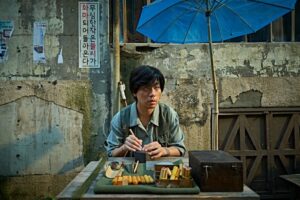What begins as a simple story of discovery soon unravels into a haunting portrait of memory, shame, and the truths we inherit from family.
With a son’s investigation at its center, The Ugly explores how the past collides with the present, forcing painful reckonings with love, loss, and illusions. Blending mystery, family drama, and psychological thriller, the film delivers a gripping narrative that asks whether uncovering the truth can truly set us free.
Written and directed by Yeon Sang-ho, the film unfolds with deliberate pacing, alternating between present-day investigation and past recollections. This structure keeps the tension alive while allowing the mystery of Young-hee’s disappearance to deepen with each revelation. While the screenplay offers moments of emotional intimacy, it also layers themes of bullying, trauma, and cultural attitudes toward beauty in ways that feel both personal and universal. It is a story of inherited pain, of how the scars of one generation shape the struggles of the next. Testimonies in the investigation reveal the cruelty of gossip, the pressures of conformity, and the quiet strength of a woman caught in a cycle of ridicule and exploitation. Each perspective adds nuance, reminding the audience that truth is always fragmented, colored by shame, jealousy, and regret.
Kwon Hae-hyo delivers a complex performance as Yeong-gyu, a blind artisan whose skill belies his shame. His portrayal reveals a man deeply wounded by society’s ridicule, caught between pride in his work and humiliation over his wife’s appearance. Kwon’s performance is understated yet deeply affecting, embodying the quiet devastation of a man who allowed external judgment to shape his family’s fate. Playing his son, Park Jeong-min gives Dong-hwan a compelling mix of resolve and vulnerability. Desperate to understand the mother he never knew, Park grounds the film’s investigation with emotional clarity. His performance captures the confusion of piecing together a family’s fractured history while maintaining deep affection for the father whose secrets he unearths. Park embodies Dong-hwan as both investigator and victim, channeling grief into determination.
The Ugly leans into grounded realism, using muted tones and intimate framing to emphasize the weight of memory. Flashbacks unfold with darker tones, underscoring how memory distorts and protects. These choices create a visual rhythm that mirrors Dong-hwan’s emotional journey: the closer he comes to the truth, the heavier and more suffocating the imagery becomes.
The Ugly is about more than one woman’s disappearance; it is about how society defines worth through appearances, and the destructive weight of those judgments. The film weaves themes of honor, validation, and intergenerational trauma into a narrative that is both unsettling and thought-provoking. While the film does not shy away from bleak truths, its storytelling remains engaging through sharp writing and carefully measured pacing. The final revelations twist perception, reframing the narrative not just as a murder mystery but as a critique of beauty standards and the lies families tell to survive. With its strong performances, thoughtful direction, and layered exploration of shame and resilience, The Ugly offers a sobering yet captivating experience. It is a film that lingers, asking its audience to confront uncomfortable realities about appearance, legacy, and the cost of denying truth.



